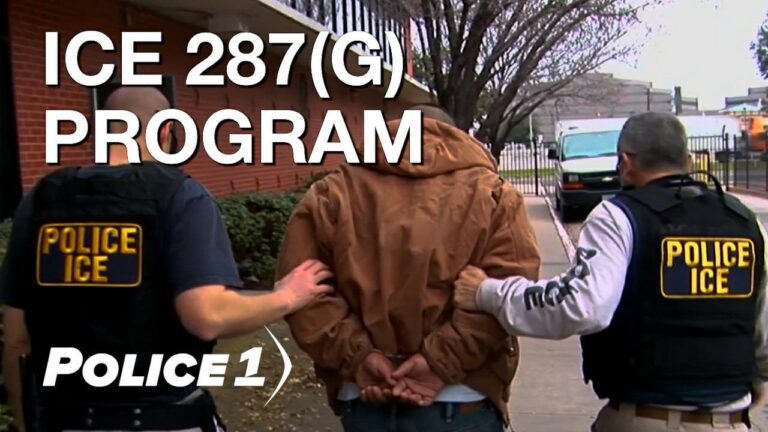Las Vegas Police Resume Collaboration with ICE’s 287(g) Jail Program Amid Immigration Policy Changes
Las Vegas law enforcement has recently announced its decision to rejoin the 287(g) jail program, a federal initiative that empowers local officers to assist U.S. Immigration and Customs Enforcement (ICE) in immigration enforcement within detention centers. This program, which was previously halted by the Las Vegas Police Department, is being reinstated as part of a strategic response to evolving immigration challenges and public safety concerns. Officials emphasize that this renewed partnership aims to enhance the city’s ability to identify and process individuals violating immigration laws while maintaining community security.
Under this program, selected officers undergo specialized training to carry out immigration-related duties within jail facilities. The key components of the program include:
- Complete Training: Officers complete approximately 80 hours of focused instruction on immigration statutes and enforcement protocols.
- Scope of Authority: Enforcement activities are limited to correctional settings, where officers can interview detainees and initiate deportation proceedings.
- Joint Oversight: The program operates under the supervision of both Las Vegas law enforcement and ICE to ensure adherence to legal standards.
| Program Component | Details | Anticipated Benefits |
|---|---|---|
| Officer Certification | Immigration law and enforcement training | Improved detection of removable individuals |
| Information Sharing | Access to ICE databases and records | Streamlined case tracking and management |
| Community Engagement | Educational outreach on immigration policies | Promotion of lawful immigration pathways |
Effects on Law Enforcement Priorities and Community Trust
The reinstatement of the 287(g) program in Las Vegas is poised to reshape local policing strategies by expanding officers’ responsibilities to include immigration enforcement within detention centers. While proponents argue this enhances public safety by targeting undocumented individuals involved in criminal activities, critics caution that it may divert resources from addressing other pressing local crimes.Balancing federal immigration duties with conventional law enforcement roles presents challenges,potentially affecting response times and community policing effectiveness.
Community reactions are expected to be diverse, with immigrant populations expressing apprehension about increased police involvement in immigration matters. Concerns center on the possibility that this partnership could erode trust, discouraging immigrants—nonetheless of their legal status—from reporting crimes or cooperating with authorities. Key elements influencing community relations include:
- Perceptions of Police Neutrality: Residents monitor whether law enforcement maintains impartiality or prioritizes immigration enforcement over equitable protection.
- Effective Dialog: Transparent outreach efforts are vital to inform communities about their rights and the scope of police authority under the program.
- Clear Enforcement Guidelines: Establishing strict protocols can definitely help prevent racial profiling and misuse of authority.
| Potential Consequence | Community Impact |
|---|---|
| Heightened collaboration with federal agencies | Stronger immigration enforcement presence |
| Distrust within immigrant communities | Lower rates of crime reporting |
| Shift in policing focus | Possible delays in local investigations |
Legal and Ethical Considerations Surrounding the 287(g) Program
The 287(g) program has been a subject of intense scrutiny from legal scholars and civil rights organizations, who highlight concerns about constitutional protections and civil liberties. Critics argue that empowering local officers to enforce federal immigration laws risks racial profiling and infringements on due process, notably affecting minority groups. The program’s blending of local and federal jurisdictions raises questions about potential violations of the Fourth and Fourteenth Amendments, especially regarding warrantless detentions based solely on immigration status.
Ethical dilemmas also arise from the program’s impact on community trust and policing efficacy. Opponents contend that prioritizing immigration enforcement may undermine public safety by deterring immigrant victims and witnesses from engaging with law enforcement. Prominent legal and ethical challenges include:
- Constitutional Risks: Issues related to unlawful searches and seizures.
- Discrimination Concerns: Potential for biased treatment based on race or ethnicity.
- Community Policing Impact: Fear of deportation weakening cooperation with police.
- Resource Diversion: Shifting focus away from broader criminal investigations.
| Dimension | Legal Issues | Ethical Implications |
|---|---|---|
| Jurisdictional Authority | Potential overextension of local powers | Accountability gaps |
| Due Process | Risk of unlawful detentions | Threats to individual rights |
| Community Relations | Heightened fear and mistrust | Compromised public safety |
Strategies for Harmonizing Public Safety with Immigrant Protections
To strike a balance between safeguarding communities and respecting immigrant rights, policymakers should prioritize clarity and accountability in programs like 287(g). Implementing self-reliant oversight and regular public reporting can ensure that enforcement actions target individuals who pose legitimate threats, rather than broad immigration sweeps that may alienate immigrant populations.
Additionally, comprehensive training programs are essential to equip officers with cultural sensitivity and a thorough understanding of immigrant rights. Recommended policy measures include:
- Defining clear boundaries for enforcement authority
- Establishing accessible complaint and redress mechanisms for misconduct
- Promoting community engagement initiatives to foster dialogue and trust
| Policy Focus | Key Considerations | Expected Outcomes |
|---|---|---|
| Transparency | Routine disclosure of enforcement activities | Strengthened community confidence |
| Training | Emphasis on human rights and anti-discrimination | Reduction in civil rights violations |
| Community Participation | Inclusive forums and feedback channels | Improved procedural fairness and cooperation |
Conclusion
As Las Vegas law enforcement recommits to the ICE 287(g) jail program, the city becomes a focal point in the broader national conversation about the role of local police in federal immigration enforcement. Advocates highlight the program’s potential to enhance public safety by focusing on undocumented individuals with criminal backgrounds, while critics emphasize the risks to community trust and civil liberties. The unfolding impact of this renewed partnership will offer critical insights into the complex balance between immigration control and community-oriented policing in urban centers across the United States.




